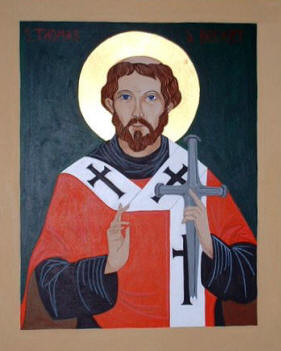| Saints and Theology of the Heart- Life of Saints |
|---|
 |
Feast: December 29 |
St. Thomas Becket was born in 1118 to a pious family. He went to school at a school of canons regular at Merton Priory, then went on to study at the University of Paris. When he returned from France, both of his parents had died. To support himself, he began working as a clerk at the sheriff’s court. At the age of 24, he was given a position at the residence of the archbishop of Canterbury and took minor orders. He received permission from the archbishop to begin studying canon law at the University of Bologna and then finished his studies in Auxerre, France. In 1154, after returning to England, St. Thomas was ordained a deacon and became archdeacon of Canterbury, which was one of the highest appointments in the Church in England at the time, after bishop or abbess. He was often sent to Rome for important missions. He also was given the position as chancellor. St. Thomas served King Henry in the war in Toulouse in 1159. He fought in the war with the knights and many people did not realize that he was an archdeacon and was criticized, but he received it all with a good sense of humor. In 1161, the archbishop died. King Henry wanted to give St. Thomas a higher position in the courts but St. Thomas told him, Should God permit me to be the archbishop of Canterbury, I would soon lose your Majesty's favor, and the affection with which you honor me would be changed into hatred. For there are several things you do now in prejudice of the rights of the Church which make me fear you would require of me what I could not agree to; and envious persons would not fail to make it the occasion of endless strife between us. King Henry ignored what he said, and had many bishops and monks sent to Canterbury so St. Thomas would not become archbishop. St. Thomas continued to refuse the higher position and moved back to Canterbury, where he was ordained a priest. Later, on the feast of Pentecost, he was consecrated as bishop of Winchester. From this point on, St. Thomas began living a life of asceticism. He would wear a hairshirt next to his skin, distribute alms and visit the sick. Even though he rejected the new position from the King, they still maintained a good relationship until the dispute over the relationship between the Church and state. This became a great crisis and St. Thomas refused the judgment of the King, saying he would only allow himself under God, by the Pope. St. Thomas spoke with the Pope about the extensive debate with King Henry. He was rebuked by the Pope and because of this, St. Thomas resigned his office. He was called back by the Pope, who told him not to abandon his office, because he would be abandoning God’s cause. He was sent to the abbot at the Cistercian monastery in Pontigny. St. Thomas took the habit and began living under the monastery’s rule. King Henry began stealing from all of those in relation with the Archbishop in England. When St. Thomas found out about this, he received permission from the Pope to excommunicate several of his adversaries. By the time all of this was done, there was a reconciliation set between St. Thomas and King Henry, because he came to agree with the excommunications. St. Thomas went to rejoin King Henry in France. He died a martyr in the year 1170, after four knights invaded his episcopal housing. Three years after he died, St. Thomas was canonized a martyr. http://www.catholic.org/saints/saint.php?saint_id=12 |
 Return to main page www.piercedhearts.org This page is the work of the Servants of the Pierced Hearts of Jesus and Mary |